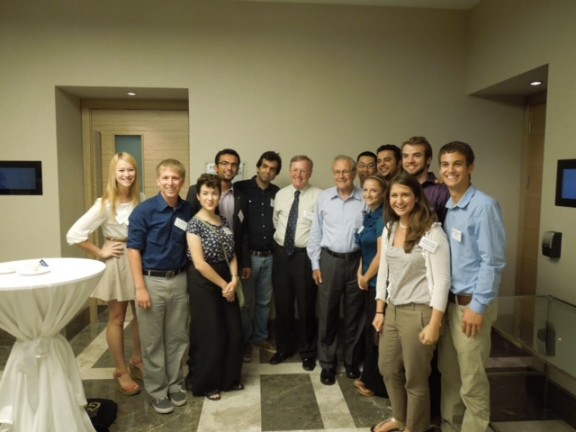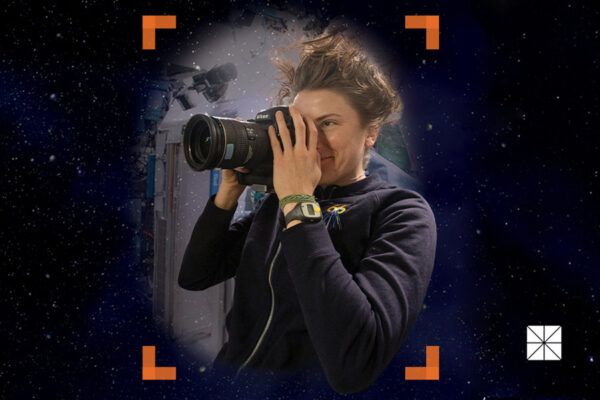
Chapman University students and James J. Coyle, Ph.D., meet former Secretary of Defense Donald Rumsfeld during study abroad tour to Azerbaijan and Georgia.
There were dozens of memorable experiences for 11 Chapman University students enrolled in a travel course that took them to Azerbaijan and Georgia this summer, from eating hot flatbread pulled from clay ovens to meeting with former Secretary of Defense Donald Rumsfeld. But one of the most telling sights for Bryce Anderson ’13 was the nonstop construction under way across from the students’ hotel in the Georgian city of Tbilisi.
“We would walk back at 2 a.m. from the Old Town in the city, and you would see the welders’ lights flashing in the scaffolding of the building. I would run every morning at 7 a.m., and you’d see the morning crews going into the building,” he says. “They were literally welding on this huge structure 24 hours a day. It was like seeing a country really try to propel itself forward.”
Such insights were just part of the 18-day study trip to the fast-changing Caucasus region. The course was made possible by the generosity of Frank Greinke, honorary consul of the Republic of Georgia, a Chapman University trustee and CEO of SC Fuels. The Azerbaijan portion of the trip was sponsored by the Consulate General of the Republic of Azerbaijan in Los Angeles.
The global lessons of the course are priceless, says Professor James Coyle, director of Chapman’s Center for Global Education and the faculty director for the summer program. While Azerbaijan is rich in natural gas, Georgia is the transit route for that fuel. And looming over the region is the Russian Federation.
“Very few people in the United States know much about them (Georgia and Azerbaijan), so it’s important for them to get the word out. It’s also important for people in the United States to understand this part of the world,” Coyle says.
Pre-trip reading for the course, titled “Political and Economic Security of Black Sea-Caspian Region: Exploring International Political Economics in a Complex Geopolitical Environment,” immersed students in the region’s history, current developments and potential future. Once abroad, the class dived into real-world experiences. Among them were briefings with executives from British Petroleum, the former Azerbaijani ambassador to the United States and a representative from the European Union.
Because the course was offered in collaboration with the Georgian Institute of Public Administration, the students also met with their student counterparts from the country.
“We really had some incredible conversations. You see the shared humanity when you interact on that level,” said Megan Demshki ’12 (J.D. ’15) “It was interesting to see the passion that Georgians have for democracy.”
While there was time for sightseeing and long “Georgian table” dinners, involving a huge meal and philosophical toasts orchestrated by a Tamada, or toastmaster, the biggest highlight came during a visit to the nation’s seaside town of Batumi. Former Secretary of Defense Rumsfeld was there to participate in a reunion of Rumsfeld Fellows, a group of international-studies scholars and future leaders from throughout Central Asia and the Caucasus. The students met Rumsfeld and were allowed to sit in during the fellows’ panel discussions.
The sum total of all those moments equals an incomparable learning experience for Chapman’s future global citizens, Coyle says.
“It brings focus,” he notes. “By the end they had a solid understanding of the issues, whereas when they arrived it was all quite vague. And they developed an affinity for the people in the region.”
Back home now, the students are busy with classes, which for Demshki means her first year at the Chapman School of Law, while Anderson is finishing up his dual-major program in political science and public relations/advertising. But they keep an eye tuned to events in both countries, particularly Georgia, where parliamentary elections were held recently and presidential elections are scheduled for next year.
“The results of those will have a huge impact on where things go in the next five years,” Anderson said. “I would love to go back.”
Chapman Newsroom
Main Menu >
Media Contacts
Office of Public Relations
PR@chapman.edu
Strategic Marketing and Communications
1 University Drive
Orange, CA 92866
Contact Us
Strategic Marketing and Communications
1 University Drive
Orange, CA 92866
Contact Us
Newsroom Site
Your Header Sidebar area is currently empty. Hurry up and add some widgets.




Add comment